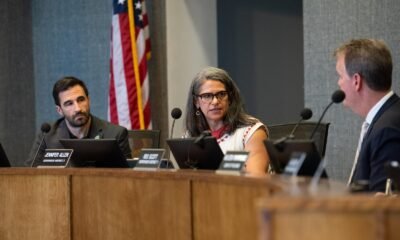Albertson's
Activist Urges Antitrust Action to Combat Food Deserts and Slash Prices

Recent discussions surrounding the merger of grocery giants Kroger and Albertsons have spotlighted the significant ramifications of 40 years of lax antitrust enforcement in the United States. Stacy Mitchell, co-director of the Institute for Local Self-Reliance, argues that the continuous neglect of relevant antitrust laws has fostered a landscape where competition has diminished, leading to the emergence of food deserts—areas void of access to healthy food options.
Mitchell’s research, particularly focused on the lack of enforcement of the 1936 Robinson-Patman Act, reveals a correlation between this negligence and the drastic decrease in grocery diversity. Her findings indicate that the abandonment of this law in the early 1980s directly contributed to the rise of concentrated ownership in the grocery industry and subsequent neighborhood grocery store closures.
The Robinson-Patman Act was initially established to prevent suppliers from offering preferential pricing to larger retailers, a provision that was essential in maintaining a competitive marketplace. However, the Reagan administration’s shift toward prioritizing efficiency over fairness resulted in the law’s non-enforcement, leading to the current dominance of a few major players in the grocery sector.
Mitchell details how this shift altered market dynamics, causing small and medium-sized grocery stores to struggle for survival. Once robust communities began to suffer as grocers left neighborhoods, creating significant gaps in food availability. “The non-enforcement was not just a factor; it was the factor,” Mitchell noted in a recent interview.
Historically, the grocery landscape was vastly different. In the 1970s, a variety of grocery chains fought for market share. However, as enforcement waned, larger retailers such as Kroger gained leverage over suppliers, which negatively impacted smaller grocery businesses. This shift, according to Mitchell, paved the way for today’s retail climate, where many communities find themselves reliant on a single grocery option, often Walmart.
The legal dispute over the proposed $25 billion merger between Kroger and Albertsons serves as a focal point in this ongoing conversation. Ohio Attorney General Dave Yost, alongside other state AGs, supported the merger, arguing it would enhance competition. However, critics, including Mitchell, anticipated its downfall, citing evidence suggesting the merger could result in price hikes within markets already lacking competition.
The overarching theme of consolidation extends beyond grocery stores to suppliers as well. Mitchell observed that as grocery chains grew, suppliers felt compelled to merge in order to negotiate effectively, resulting in a few companies monopolizing the consumer goods market. She emphasized the need for a competitive marketplace to ensure consumer choice aligns with pricing. “If we had a competitive grocery market, consumers would have seen a high-priced item from General Mills and chosen something else,” she stated.
In light of rising grocery prices and inflation, some reform efforts are underway. The Federal Trade Commission (FTC) has initiated actions suggesting a renewed commitment to antitrust enforcement, such as halting the Kroger-Albertsons merger. Yet uncertainty lingers with potential changes in leadership at the FTC that could influence future enforcement actions.
As the administration transitions, the focus on maintaining competitive dynamics in the grocery industry remains critical. The implications of both past enforcement failures and potential future policies will significantly shape the grocery landscape in the United States, impacting consumers directly.


















